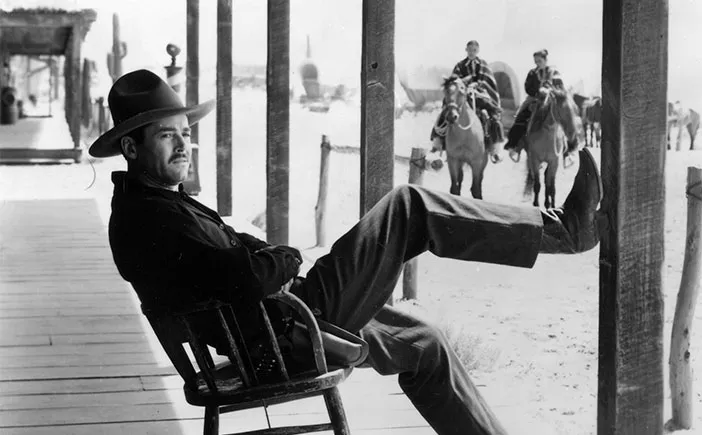← Back to Reviews
in
#572 - My Darling Clementine
John Ford, 1946

A marshall turned cattle drover is forced to take action when he enters a lawless frontier town and has to do battle with both its contentious doctor and a group of cattle rustlers.
Though I'd already seen Tombstone and therefore had a fair bit of familiarity with the real-life exploits of Wyatt Earp and Doc Holliday (albeit filtered through the sensibilities of a 1990s Western), My Darline Clementine still deserves some consideration on the basis of it being Western legend Ford's interpretation of events. Henry Fonda and Victor Mature play Earp and Holliday respectively, with the former initially looking to do nothing more than do some cattle droving with his brothers. When one of his brothers is murdered and the cattle is stolen, Earp is forced to take on the role of marshall in the nearby town of Tombstone, which is so incredibly lawless that the current marshall and his deputies are unwilling to do their job right. The job also puts him in conflict with Holliday, a surgeon turned gambler who rules over the local saloon but is afflicted with consumption. Though he immediately butts heads with Earp, the two gradually form an unlikely friendship even in the face of obstacles such as a family of vicious cattle drovers or the complex romantic quandary that forms when Holliday's ex (Cathy Downs, the "Clementine" of the title) and present paramour (Linda Darnell) come into conflict with one another.
Fonda naturally makes for a handsome and affable hero who still has enough emotional vulnerability to make him feel well-rounded, while Mature's off-kilter screen presence (which makes me think of an uncanny and less charismatic version of Dean Martin) makes him a decent choice of actor to play the perpetually inebriated and sickly Holliday (though it'll probably never overtake Val Kilmer's twanging drawl in my memory). The cast is stacked with dependable character actors, while Downs and Darnell get decent enough subplots so that the film doesn't feel like it hits a brick wall whenever it decides to draw attention to them. The film does have the odd moment when it does slow down a bit too hard for its own good, such as one scene involving a traveling actor drunkenly reciting Shakespeare. However, the film's dud moments are more than compensated for by Ford's technical abilities, which do become important when the film opts to add some external action, especially during the third act. The finale is definitely a major point in the film's favour, and though I'm not entirely sold on it being a genuinely classic film, there's plenty going on that makes me think of it favourably.
John Ford, 1946

A marshall turned cattle drover is forced to take action when he enters a lawless frontier town and has to do battle with both its contentious doctor and a group of cattle rustlers.
Though I'd already seen Tombstone and therefore had a fair bit of familiarity with the real-life exploits of Wyatt Earp and Doc Holliday (albeit filtered through the sensibilities of a 1990s Western), My Darline Clementine still deserves some consideration on the basis of it being Western legend Ford's interpretation of events. Henry Fonda and Victor Mature play Earp and Holliday respectively, with the former initially looking to do nothing more than do some cattle droving with his brothers. When one of his brothers is murdered and the cattle is stolen, Earp is forced to take on the role of marshall in the nearby town of Tombstone, which is so incredibly lawless that the current marshall and his deputies are unwilling to do their job right. The job also puts him in conflict with Holliday, a surgeon turned gambler who rules over the local saloon but is afflicted with consumption. Though he immediately butts heads with Earp, the two gradually form an unlikely friendship even in the face of obstacles such as a family of vicious cattle drovers or the complex romantic quandary that forms when Holliday's ex (Cathy Downs, the "Clementine" of the title) and present paramour (Linda Darnell) come into conflict with one another.
Fonda naturally makes for a handsome and affable hero who still has enough emotional vulnerability to make him feel well-rounded, while Mature's off-kilter screen presence (which makes me think of an uncanny and less charismatic version of Dean Martin) makes him a decent choice of actor to play the perpetually inebriated and sickly Holliday (though it'll probably never overtake Val Kilmer's twanging drawl in my memory). The cast is stacked with dependable character actors, while Downs and Darnell get decent enough subplots so that the film doesn't feel like it hits a brick wall whenever it decides to draw attention to them. The film does have the odd moment when it does slow down a bit too hard for its own good, such as one scene involving a traveling actor drunkenly reciting Shakespeare. However, the film's dud moments are more than compensated for by Ford's technical abilities, which do become important when the film opts to add some external action, especially during the third act. The finale is definitely a major point in the film's favour, and though I'm not entirely sold on it being a genuinely classic film, there's plenty going on that makes me think of it favourably.
